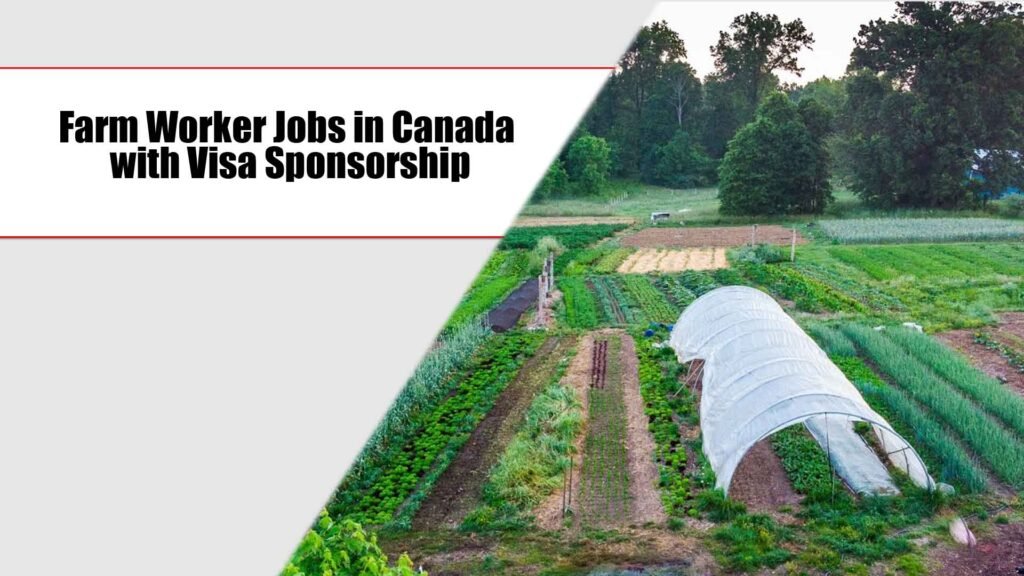Looking for honest work in Canada with visa support? Don’t have a degree? No problem.
General farm worker jobs in Canada with visa sponsorship are among the most accessible and in-demand roles for foreign applicants. Whether you’ve worked on a farm before or you’re ready to learn, this could be your entry point to a legal, well-paying job in one of the world’s most welcoming countries.
Canada’s agricultural industry needs hands. A lot of them. From planting and harvesting to animal care and equipment handling, farms across the country are hiring — and many are offering visa sponsorship to help international workers join their teams in 2025.
Let’s dive into what the job is, who can apply, what it pays, and how to get started.
Why Canada Needs Farm Workers in 2025
Canada’s farms are big. And with fewer Canadians taking up manual labor jobs, the agriculture sector is heavily reliant on foreign workers to keep going.
From British Columbia to Ontario, and all the way to Prince Edward Island, farmers need help. That’s why the government continues to support Temporary Foreign Worker (TFW) programs, making it easier for non-residents to apply for seasonal and full-time roles.
These roles are not just seasonal anymore — year-round general farm worker jobs are growing, especially in greenhouses, poultry farms, dairy operations, and fruit orchards.
What Does a General Farm Worker Do?
Farm work is physical, simple, and honest. You don’t sit at a desk. You don’t wear a suit. You get up early, work with your hands, and see the results of your effort by the end of the day.
Here’s what you might be doing:
- Planting, watering, and weeding crops
- Feeding and caring for animals (like cows, chickens, or pigs)
- Operating basic farm equipment (after training)
- Sorting, cleaning, and packing produce
- Repairing fences and maintaining tools
- Cleaning barns, pens, and greenhouses
Your duties may change depending on the season and the type of farm. You’ll usually work early mornings and sometimes weekends. Some roles also involve working in greenhouses — which are indoors but still labor-intensive.
Who Can Apply?
These jobs are open to foreign nationals, and you don’t need a degree or high-level experience. But you should be healthy, reliable, and ready to work outdoors.
Basic Requirements:
- Age 21 to 45 preferred
- Physically fit (able to lift and bend repeatedly)
- Basic English or French (spoken and understood)
- No criminal record
- Willing to live in rural areas and work long shifts
- High school education (not always required)
Having previous farm experience is helpful, but many employers offer training. What matters most is your attitude — showing up on time and doing your part.
Visa Sponsorship Explained
Most foreigners apply through Canada’s Temporary Foreign Worker Program (TFWP). This program allows Canadian employers to hire foreign nationals when there are no local workers available.
The process:
- Employer gets a Labour Market Impact Assessment (LMIA)
- They offer you a valid job contract
- You apply for a work permit and visa
- Once approved, you can legally travel and work in Canada
The visa typically lasts for 1–2 years, and many workers renew it or apply for permanent residency through other immigration programs later.
How Much Do Farm Workers Earn in Canada?
Canada pays farm workers fairly — with wages depending on the province and the type of work.
Here’s a quick look at average pay in 2025:
| Province | Hourly Wage (CAD) | Monthly Estimate (CAD) |
|---|---|---|
| Ontario | $16 – $19 | $2,500 – $3,000 |
| Alberta | $17 – $20 | $2,700 – $3,200 |
| British Columbia | $16 – $18 | $2,500 – $2,900 |
| Manitoba | $15.50 – $17 | $2,400 – $2,700 |
| Nova Scotia | $15 – $16.50 | $2,300 – $2,500 |
Overtime pay is common, and during harvest season, workers often earn extra by working longer hours.
Benefits often include:
- Free or low-cost accommodation
- Transportation to work
- Basic health coverage
- Protective clothing and gear
Living costs in rural areas are low, so many workers save most of their income.
Where Are These Jobs Available?
Canada’s farms are spread across the country, but some provinces offer more jobs for foreigners.
Top provinces hiring in 2025:
- Ontario – Fruit farms, greenhouses, poultry
- British Columbia – Vineyards, berry farms, nurseries
- Alberta – Grain farms, cattle ranches, dairy
- Quebec – Apple orchards, vegetable farms
- Manitoba & Saskatchewan – Wheat and livestock
Most farms are outside big cities, so be prepared for simple rural living.
How to Apply Online (Step-by-Step)
Step 1: Prepare Your Documents
- Updated CV/resume (in English or French)
- Passport scan
- High school certificate (if available)
- Reference letters (if you’ve worked before)
- Police clearance and basic medical report
Step 2: Find Jobs That Offer Visa Sponsorship
Use search phrases like:
- “General farm worker jobs in Canada with visa sponsorship”
- “LMIA approved farm jobs Canada 2025”
- “Canada farm work hiring foreigners 2025”
Best websites to apply:
- JobBank.gc.ca (Canada’s official job site)
- Indeed.ca
- Workopolis.com
- AgriRecruiting.com
- LinkedIn Jobs (Canada region)
Look for jobs that clearly mention:
“LMIA provided”, “Visa sponsorship available”, or “Hiring foreign workers.”
A Day in the Life on a Canadian Farm
It starts early. The sun is just rising. You’re already feeding animals or prepping tools.
You work in teams. Sometimes it’s quiet — just you and the sound of birds or machines. Other times, there’s friendly banter as you sort tomatoes or clean the barn.
At lunch, you eat in the field or worker quarters. In the evenings, you rest — tired, but satisfied. You’re building something here. Earning honestly. And slowly, creating your path to a better future.
Final Tips to Get Hired
Want to increase your chances?
- Highlight any physical work experience
- Keep your CV clear and simple
- Be honest in your application
- Show you’re willing to relocate and work hard
- Apply early — competition grows as the season gets closer
Final Thoughts
General farm worker jobs in Canada with visa sponsorship offer a real chance to live and work legally in one of the best countries in the world.
No degree? No problem. With strong hands, a good heart, and a willingness to show up — you can begin a new journey in Canada’s fields, barns, and greenhouses.
So start applying now. The soil is ready. The work is waiting. And your opportunity is just a few clicks away.

